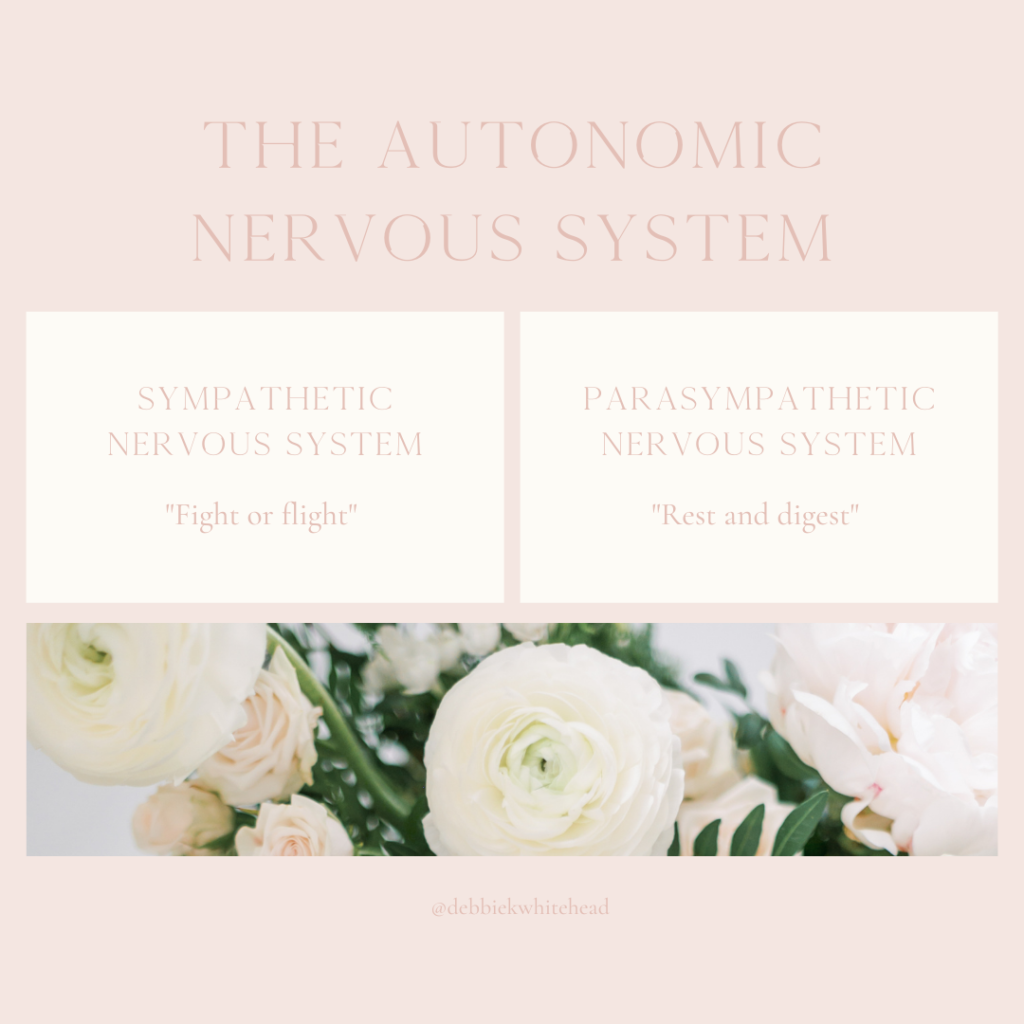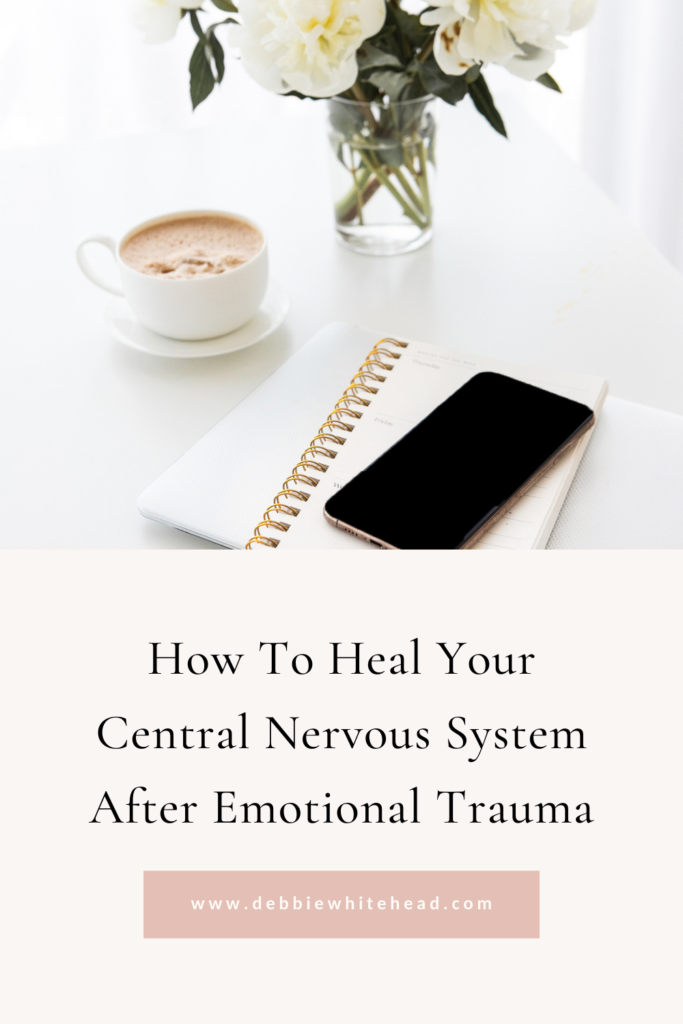When we experience stressful events or trauma, one of the body’s systems that is affected the most is the central nervous system. In this article, I share how our central nervous system functions when we experience emotional trauma and chronic stress.
I also break down simple ways to indicate whether or not your central nervous system has been impacted and 8 tips to sleep better at night, feel calm, and heal through trauma.
What Is The Central Nervous System?
The central nervous system is located between the brain and spinal cord. It is necessary for communicating and controlling information throughout our body. The specific part of the nervous system I want to focus on in this article is the autonomic nervous system.
The autonomic nervous system is responsible for the sympathetic and parasympathetic responses. These responses are involuntary, unconscious, and automatic. As we move throughout our day, the job of the autonomic nervous system is to help the sympathetic and parasympathetic systems work in harmony.

The sympathetic nervous system is responsible for our “fight or flight” response and our parasympathetic nervous system is responsible for what is called our “rest and digest” response. When we have a real or perceived threat of stress or danger, our body immediately goes into the fight or flight mode.
Many physiological responses take place to prepare our mind and body for this mode; adrenaline and cortisol are released into our bloodstream, vision becomes sharper, heart rate increases, thoughts become scattered, the digestion process ceases, and breathing becomes quicker. These responses are necessary and will help save our life when we’re in danger.
For example, the fight or flight mode was necessary for our ancestors to hunt and survive. If they encountered a dangerous situation, they knew they could either fight or run. For us today, it still helps us survive! But to be healthy, emotionally and physically, we do not want to stay in this state for prolonged periods of time. When we do, our ability to rest, sleep deeply through the night, process emotions, digest food, and feel our best is compromised.
We want to thrive, not just survive. Our bodies need to experience the rest or digest state to be healthy.
I think of the parasympathetic nervous system as the “paramedics” of our nervous system because the physiological responses in this state come to our rescue; adrenaline is halted, vision relaxes, heart rate is slower, thinking becomes more clear, digestion begins again, and breathing becomes deeper.
How to Know if Your Central Nervous System Has Been Impacted
I often have clients living their life in a fight or flight mode and they aren’t even aware of it. Over time, staying in a constant state of fight or flight will comprise your nervous system, immune system, hormones, and mental health. Here’s what I look for:
- Have a hard time relaxing.
- Constantly on the go to avoid thinking about their life.
- Consistently defensive about situations in their life that could quickly be minimized.
- Have an easy time picking a fight with those around them.
- Easily upset stomach, experiencing nausea, diarrhea, or don’t have an appetite.
- Experience headaches or muscle aches.
- Struggling to fall asleep at night or waking up tired, even after a full night of sleep.
- Painful period cramps and PMS.
- Constantly craving sugar.
- Needing to stay caffeinated throughout the day.
8 Tips to Heal Your Central Nervous System
In my counseling practice, I’ve worked with clients that seem to be “stuck” in the sympathetic nervous system state, and it’s often the clients that have experienced chronic stress or emotional trauma.
If someone has been conditioned to be on high alert because of constant stressful situations and trauma like childhood sexual abuse or domestic abuse, they may need help relearning how to calm their mind and body.
Even though the fight or flight response engages automatically, an individual can learn to turn on their body’s response of rest or digest in the parasympathetic mode through things like deep breathing and mindfulness.
Come back to these tools all throughout the day and begin to notice the changes you feel in your body over time.

8 Tips to Begin Healing Your Central Nervous System:
- If possible, remove the stressor or traumatic event from your life. At the very least, work to minimize it.
- Talk through the stressor or traumatic event with a counselor. Cognitive Therapy is powerful for helping you understand how those situations are impacting your life.
- Identify affirmations that are calming for you. For instance, “I am safe,” “I can relax,” “It’s okay for my mind to be calm,” “It’s okay for my body to be calm.” These are sentences that you can repeat over and over when you start to feel anxious or when your body tightens up.
- Be aware of your physiological responses. Are there situations where your heart is beating fast? Your palms are sweaty? Your stomach is experiencing nausea? A certain part of your body is tightening up? Your body will reveal what you feel internally. Listen to your body by noticing how it responds to situations.
- Engage in activities that are calming and relaxing for you. Yoga, stretching, meditation, prayer, journaling, listening to music, grounding, mindfulness, massage, chiropractic care, sitting in a serene place, or even taking a walk in nature works for a lot of people.
- Practice TFA (Thoughts/Feelings/Actions). Identify what you are thinking, feeling, and how you are responding to those thoughts and feelings at any given moment.
- Focus on your breathing. Breath work has immediate benefits. When we are stressed, we are in the sympathetic mode and our breath is shallow and fast. If we can slow our breath down we can activate the parasympathetic system. *See below for a breathing exercise.
- Eat mindfully. When eating, slow down to taste and savor your food. Our body has a hard time digesting food when we’re always in a rush.
*Try this breathing exercise: Breathe in through the nose (expanding your tummy and diaphragm) for 4 counts, hold for 7 counts, breathe out of your mouth slowly for 8 counts. Repeat 5 times. This breathing exercise is especially helpful when falling asleep or in stressful situations.
I hope these thoughts and suggestions help you understand the central nervous system and its impact on mental health. I believe it’s possible to heal from chronic stress and emotional trauma. A great place to start is by putting tools in place that you can come back over and over again. If you have any questions, please reach out. I’m just an email away!
With love,
~Debbie~
Debbie Whitehead is a licensed professional counselor (M.Ed, LPC), certified personal trainer (CPT), and certified nutrition coach. She owns a practice in Plano, Texas where she helps clients break free from trauma and live a beautiful life – mind, body, and soul.













- Hide Comments